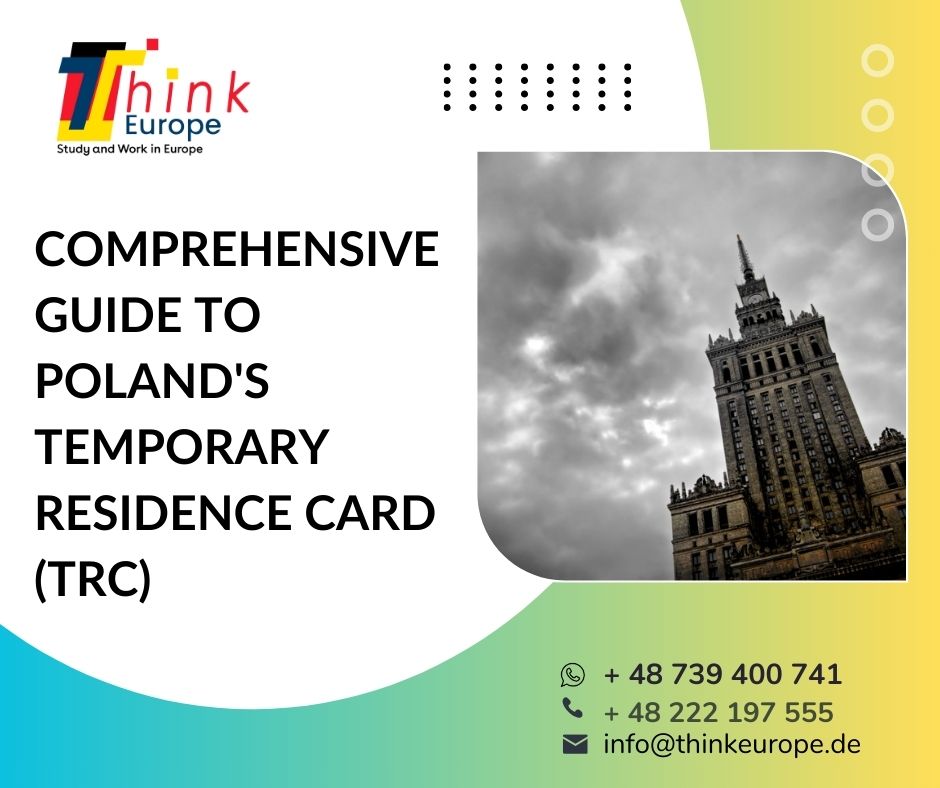Comprehensive Guide to Poland's Temporary Residence Card (TRC)
If you're considering moving to Poland for work, study, or other long-term activities, obtaining a Temporary Residence Card (TRC) is an essential step. This blog provides a detailed overview of the Poland TRC, including its benefits, eligibility requirements, application process, and important considerations.
What is a Temporary Residence Card (TRC)?
A Temporary Residence Card (Karta Pobytu) in Poland is a document that grants non-EU citizens the right to reside in Poland for a period longer than three months. It serves as both a residence permit and an identity card, allowing holders to travel freely within the Schengen Area for short stays.
Benefits of a Poland TRC
1. Legal Stay: It legally authorizes your stay in Poland for more than three months.
2. Work Authorization: In most cases, it allows you to work in Poland without requiring a separate work permit.
3. Schengen Travel: It permits short-term travel within the Schengen Zone.
4. Access to Services: Easier access to banking, healthcare, and other services.
5. Family Reunification: Your family members can also apply for residence based on your TRC.
Eligibility Criteria for a Poland TRC
To be eligible for a TRC, you must fall into one of the following categories:
1. Employment:
- You have a valid work contract with a Polish employer.
- You have a salary that meets the minimum income requirements.
2. Business:
- You plan to start or already run a business in Poland.
- Your business activity is economically beneficial for Poland.
3. Study:
- You are enrolled in a full-time study program at a Polish university.
4. Family Reunification:
- You are a family member of a person holding a residence permit or a citizen of Poland.
5. Other:
- Scientific research, training, long-term medical treatment, or other reasons justified by personal circumstances.
Application Process for a Poland TRC
1. Prepare Your Documents:
- Valid passport.
- Completed application form.
- Recent biometric photo.
- Proof of health insurance.
- Proof of financial stability (bank statements, employment contract, etc.).
- Additional documents specific to your purpose of stay (e.g., work contract, university admission letter).
2. Submit Your Application:
- Visit the nearest Voivodeship Office (Urząd Wojewódzki).
- Submit the application along with all required documents.
- Pay the application fee (approximately 340 PLN, varying slightly by region).
3. Biometric Data Collection:
- Provide fingerprints and a digital photograph at the Voivodeship Office.
4. Wait for a Decision:
- The processing time can range from one to three months.
- You may be asked to provide additional documents or attend an interview.
5. Receive Your TRC:
- Once approved, you will be notified to collect your TRC.
- The card is typically valid for one to three years, depending on your circumstances.
Important Considerations
1. Renewal:
- You must apply for renewal before your current TRC expires.
- The renewal process is similar to the initial application.
2. Permanent Residence:
- After five years of continuous stay, you may be eligible to apply for a Permanent Residence Card.
3. Legal Obligations:
- Inform the authorities of any change in your status (e.g., change of address, employment).
- Adhere to Polish laws and regulations during your stay.
4. Rejection and Appeal:
- If your application is rejected, you have the right to appeal the decision within 14 days.
5. Travel Restrictions:
- While the TRC allows travel within the Schengen Area, it does not permit long-term stays in other Schengen countries.
FAQs
1. Can I apply for a TRC if I'm already in Poland on a visa?
- Yes, you can apply for a TRC while legally staying in Poland on a visa.
2. Can I work in Poland with a TRC issued for study purposes?
- Yes, but there may be restrictions on the number of hours you can work during the academic year.
3. How long does it take to get a TRC?
- The process typically takes between one to three months, but it can vary.
4. What should I do if my application is rejected?
- You can appeal the decision within 14 days of receiving the rejection notice.
5. Is it possible to expedite the TRC application process?
- There is no formal expedited process, but having all documents correctly submitted can avoid delays.
Conclusion
Obtaining a Temporary Residence Card in Poland is a significant step towards establishing your life in the country. Whether you're coming for work, study, or to reunite with family, understanding the process and meeting the requirements will help ensure a smooth application experience. With a TRC, you can enjoy the numerous benefits of living in Poland and exploring the Schengen Area.

